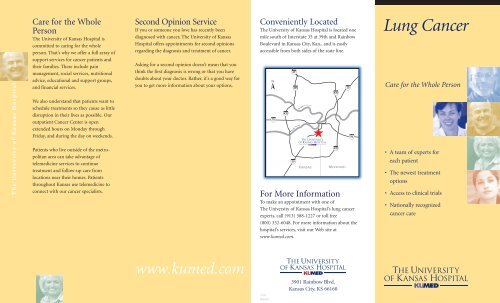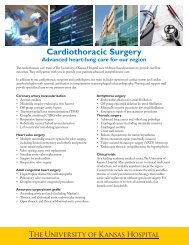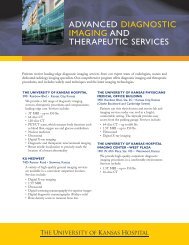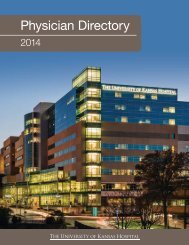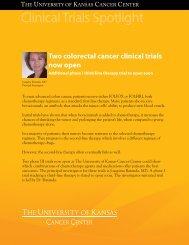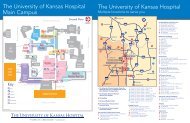Lung Cancer Brochure - The University Of Kansas Hospital
Lung Cancer Brochure - The University Of Kansas Hospital
Lung Cancer Brochure - The University Of Kansas Hospital
Create successful ePaper yourself
Turn your PDF publications into a flip-book with our unique Google optimized e-Paper software.
<strong>The</strong> <strong>University</strong> of <strong>Kansas</strong> <strong>Hospital</strong>Care for the WholePerson<strong>The</strong> <strong>University</strong> of <strong>Kansas</strong> <strong>Hospital</strong> iscommitted to caring for the wholeperson. That’s why we offer a full array ofsupport services for cancer patients andtheir families. <strong>The</strong>se include painmanagement, social services, nutritionaladvice, educational and support groups,and financial services.We also understand that patients want toschedule treatments so they cause as littledisruption in their lives as possible. Ouroutpatient <strong>Cancer</strong> Center is openextended hours on Monday throughFriday, and during the day on weekends.Patients who live outside of the metropolitanarea can take advantage oftelemedicine services to continuetreatment and follow-up care fromlocations near their homes. Patientsthroughout <strong>Kansas</strong> use telemedicine toconnect with our cancer specialists.Second Opinion ServiceIf you or someone you love has recently beendiagnosed with cancer, <strong>The</strong> <strong>University</strong> of <strong>Kansas</strong><strong>Hospital</strong> offers appointments for second opinionsregarding the diagnosis and treatment of cancer.Asking for a second opinion doesn’t mean that youthink the first diagnosis is wrong or that you havedoubts about your doctor. Rather, it's a good way foryou to get more information about your options.Conveniently Located<strong>The</strong> <strong>University</strong> of <strong>Kansas</strong> <strong>Hospital</strong> is located onemile south of Interstate 35 at 39th and RainbowBoulevard in <strong>Kansas</strong> City, Kan., and is easilyaccessible from both sides of the state line.Kanss RMisverouri River<strong>Kansas</strong>MissouriFor More InformationTo make an appointment with one of<strong>The</strong> <strong>University</strong> of <strong>Kansas</strong> <strong>Hospital</strong>’s lung cancerexperts, call (913) 588-1227 or toll free(800) 332-6048. For more information about thehospital’s services, visit our Web site atwww.kumed.com.<strong>Lung</strong> <strong>Cancer</strong>Care for the Whole Person• A team of experts foreach patient• <strong>The</strong> newest treatmentoptions• Access to clinical trials• Nationally recognizedcancer carewww.kumed.com3/06BR8973901 Rainbow Blvd.<strong>Kansas</strong> City, KS 66160
<strong>The</strong> <strong>University</strong> of <strong>Kansas</strong> <strong>Hospital</strong>lung cancerAt <strong>The</strong> <strong>University</strong> of <strong>Kansas</strong><strong>Hospital</strong>, patients with lungcancer receive care from amultidisciplinary team ofexperts who devise theoptimal treatment planfor each individual.Know Your Risk<strong>Lung</strong> cancer is the leading cause ofcancer death for both men and women.More people die of lung cancer than ofcolon, breast and prostate cancerscombined. Fortunately, progress is beingmade in detecting, diagnosing andtreating lung cancer.As with other types of cancer, the outlookfor treating lung cancer is best with earlydetection. But most people in the earlystages of lung cancer do not have anysymptoms, so it is especially important tounderstand your risk for this disease. If you and yourdoctor feel that your risk is increased, a routine chestX-ray will be considered.Factors that increase your chance of developing lungcancer include:• Cigarette smoking (Almost 90 percent of lungcancers result from tobacco use.)• Cigar and pipe smoking• Exposure to secondhand smoke, radon or asbestos• Exposure to certain air pollutants or coal dust• <strong>Lung</strong> diseases, such as tuberculosis• Family history of lung cancerBe ProactiveSome symptoms are suggestive of lung cancer. Tellyour doctor right away if you have any of thefollowing symptoms:• A cough that does not go away• Chest pain, often made worse by deep breathing• Shortness of breath, wheezing or hoarseness• Weight loss and loss of appetite• Bloody or rust-colored sputum• Recurring infections, such as bronchitis andpneumoniaWhile these symptoms can be caused by conditionsother than lung cancer, a chest X-ray and often a CTscan may be recommended for further evaluation.If those tests suggest lung cancer, additional tests andoften a biopsy may be performed to confirm thediagnosis and establish the extent (stage) of thedisease.Treatment Tailoredto the IndividualPatients with lung cancer need treatment tailored totheir particular situations, determined by the type oflung cancer and its stage.At <strong>The</strong> <strong>University</strong> of <strong>Kansas</strong> <strong>Hospital</strong>, your personalteam of lung cancer specialists will consider allcurrent treatment options to devise the optimal planfor you.If needed, additional specialists, such as gastroenterologistsand cardiologists, are readily available tomanage other medical issues that might arise.<strong>The</strong> most common treatment options for lungcancer are surgery, radiation therapy and chemotherapy,or a combination of these. Our physicians alsooffer innovative treatments developed through theirresearch, such as endobronchial brachytherapy, aform of internal radiation treatment.A team of cancer physicians will follow youthrough your diagnosis, staging, treatment andfollow-up care. Team members will also workclosely with your referring physician.In addition, our specialists recommend patientsfor clinical trials so they can take advantage ofthe latest therapies, including new drugs andnon-chemotherapeutic agents.<strong>The</strong> ThoracicOncology ClinicIf you’re diagnosed with a certain kind oflung cancer known as non-small cellcancer, you may be referred to our uniqueThoracic Oncology Clinic for treatment.Here, patients who have cancer in the thorax(the chest area) receive the attention of anexpert multidisciplinary team, which includesmedical oncologists, radiation oncologists, athoracic surgeon and other specialists as needed.This team meets each week to discuss how tobest treat each patient’s case.On your first visit to the hospital, you will see allof the physicians who will guide your treatment.If you need any additional tests, they can becompleted at our hospital, which provides thelatest technology for the detection, diagnosisand staging of cancer.


